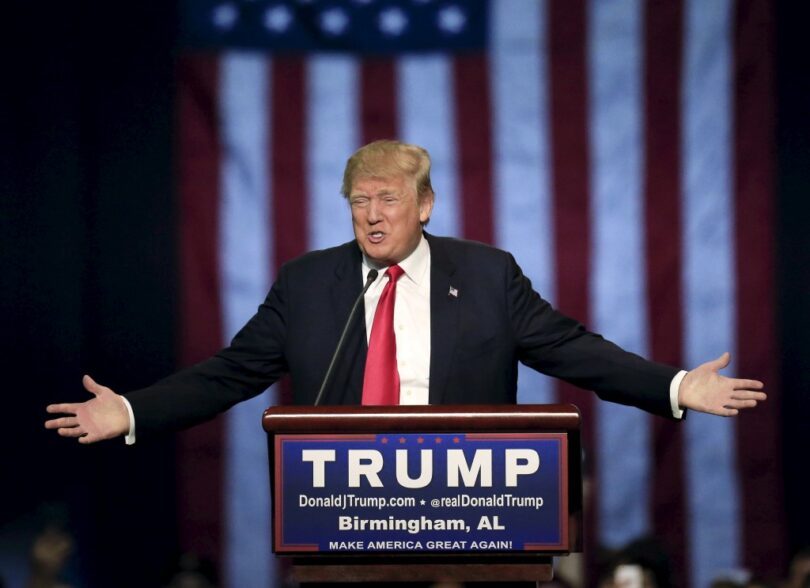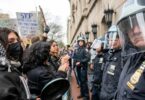Julian Zelizer
If the nation learned one thing during Donald Trump’s presidency, it’s that he does what he says he will do. Which is why recent comments by Trump, the leading nominee in the Republican primary for the 2024 presidential election, once again shattering the norms of political speech, have justifiably raised alarm.
On Veteran’s Day, Trump called his enemies “vermin” and spoke of his intention to go after opponents should he regain power. “The threat from outside forces,” he said, “is far less sinister, dangerous and grave than the threat from within.” In Trump’s twisted world, the dangers once posed by caravans of illegal immigrants have been supplanted by his domestic opponents. And when he was president, his fearmongering rhetoric was translated into devastatingly real-world actions; his anti-immigrant posture led to policies like entry bans for many and separations of migrant families at the border while in office.
So it’s essential to understand that, besides deploying an autocratic vocabulary to whip up support among those who love him and intimidate those who do not, Trump’s words rest on a broader vision for a vast expansion of presidential power. This is not just an imminent threat because of what a Trump presidency would represent, but also because, given the lessons of the history, future presidents could be emboldened by it as well. Trump has been working with the Heritage Foundation to map out a plan for filling key agency positions with loyalists. Part of the goal is to screen tens of thousands of individuals to make sure that they would follow his orders as president.
Trump is also thinking of issuing many pardons to overturn the work completed by the Department of Justice under President Joe Biden prosecuting him, his advisors and his allies. He wants the authority to remove labor protections for the civil service so that he can hire and fire federal workers at will, while dramatically extending his power into the realm of education in particular. Federal prosecutors would be brought in to curb local crime, and the White House would tighten its grip over the Department of Justice, continuing to shatter the separation that emerged after Watergate. Just in case anyone is missing the President Richard Nixon comparison, Trump would start impounding congressional funds again – refusing to spend money that the House and Senate appropriated – which is exactly what caused Congress to pass major reforms in 1974 centralizing the budget process and constraining the use of impoundments.
As The New York Times reports, Trump and his associates want to “alter the balance of power by increasing the president’s authority over every part of the federal government that now operates, by either law or tradition, with any measure of independence from political interference by the White House, according to a review of his campaign proposals and interviews with people close to him.” To do so, the Times continued, “Mr. Trump intends to bring independent agencies – like the Federal Communications Commission, which makes and enforces rules for television and internet companies, and the Federal Trade Commission, which enforces various antitrust and other consumer protection rules against businesses – under direct presidential control.”
To be sure, the growing authority of the presidency is nothing new. Nor is it a Republican story. Executive power has steadily expanded since the founding of the republic, accelerating greatly the 1930s and 1940s when President Franklin Roosevelt vastly expanded the executive branch. Although liberals had once praised this power as a necessary source of centralization which would allow decisive leadership to address the nation’s needs, hope turned to fear when Nixon revealed how that authority could be used for dangerous ends to go after opponents, reward loyal supporters and to conduct illicit and even illegal operations. As the Watergate investigation was getting underway, historian Arthur M. Schlesinger Jr. acknowledged that he had previously not fully recognized the dangers of empowering presidents until he wrote his 1973 book, “Imperial Presidency.”
Although Congress passed a series of reforms in the 1970s – such as the 1973 War Powers Act – that curtailed the presidency, the institution continued to expand its reach in the decades to come. Some reforms, such as a 1978 law that created an independent prosecutor who could investigate certain allegations in the executive branch, were allowed to expire. Others were overturned, and others proved ineffectual. Following the terrorist attacks on 9/11, President George W. Bush pushed for another vast expansion of executive power on the grounds that it was essential to protect national security.
Presidential power has been a bipartisan affair. Democrats have used the authority for their own ends. Frustrated with the Republican Congress, for instance, President Bill Clinton used executive action to expand the environmental programs of the federal government. Most recently, Biden leaned on executive power to advance a student loan forgiveness program that the courts ultimately overturned. While presidents from both parties have deployed executive power, not all presidents have intentionally mapped out plans to go after their enemies without any legal justification. This is what Trump has in mind and it’s downright Nixonian. It’s also why he represents a threat to the Oval Office that goes beyond the typical issue of consolidating power.
Trump has shown quite clearly how he is willing to ignore any institutional or normative guardrails that have been in place – from leveraging foreign aid as a way to obtain campaign fodder on an opponent to rejecting the legitimate results of an election. He has continually used his bully pulpit, in rallies and on social media, to target opponents and inflame his army of supporters. The ability to manipulate the power of his position has been made clear, though, as the findings about January 6 revealed. What many initially thought was yet another moment of Trumpian chaos was actually a systematic, carefully orchestrated and quite sweeping plan to overturn the results of the 2020 presidential election, according to multiple congressional and legal investigations.
If it had not been for the action of key individuals, from former Vice President Mike Pence to numerous federal judges, the plan could have been successful. The lesson should not be that the system worked, but how close we came to a total disaster and how our democracy depended on people doing the right thing at the right time. Voters should be paying close attention right now. When presidents use presidential power in dangerous ways, not only does this present a dangerous stress test at the moment, but it also means that over time, the expansions of power are rarely cut back. When Trump breaks governing norms, he also establishes dangerous new ones.
CNN







